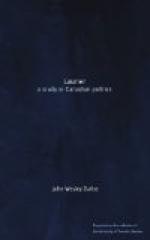The episode passed apparently without disruptive results; but surface indications were misleading. In reality a heavy blow had been struck at the unity of the Liberal party; there began to be questionings in unexpected quarters of the Laurier leadership. What had happened was only too clear, to those who looked at the situation steadily. Party policy had been shaped with a single eye to Quebec necessities; and party feeling, party discipline, the personal authority of Laurier has been drawn on heavily to secure acceptance of this policy by Liberals who did not favor it. But there is in politics, as in economics, a law of diminishing returns. A year later the same tactics applied to a situation of greater gravity ended in disaster. The split which came in 1917 followed pretty exactly the split that would have come in 1916 over bilingualism, had the Liberal members not been constrained by their devotion to party regularity to vote against their convictions.
THE MOVEMENT FOR NATIONAL GOVERNMENT
The movement for national government long antedated the emergence of the issue of conscription; it was, in its origin, Liberal. Its most persistent advocates in the later months of 1916 and the opening months of 1917 were Liberal newspapers, among them the Manitoba Free Press; and there was an answer from the public which showed that the appeal for a union of all Canadians who were concerned with “getting on with the war” made a deep appeal to popular feeling. The most determined resistance came from the Conservatives. The ministerial press could see nothing in it but a Grit scheme to break up the Borden government, which they lauded as being in itself a “national government” of incomparable merit. But that movement was equally disconcerting to the Liberal strategists since it threatened to interfere with their plans for a battle, to end, as they confidently believed, in a Liberal victory. In January, 1917, Sir Wilfrid could see nothing in the movement but an attempt to prevent a French-Canadian from succeeding to the premiership, and wrote in those terms to N. W. Rowell.




